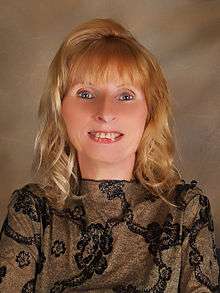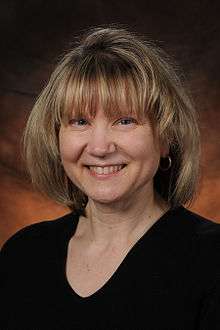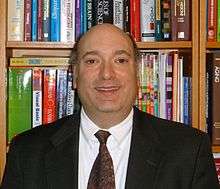International FOP Association
 | |
| Founded | 1988 |
|---|---|
| Founder | Jeannie L. Peeper, BA |
| Focus | A Cure for FOP |
| Location |
|
Area served | World wide |
| Method | Fund research to find a cure for Fibrodysplasia Ossificans Progressiva while supporting individuals and their families through education, public awareness and advocacy |
Key people |
Jeannie L. Peeper, BA, President Paul Brinkman, PhD, Board Chairperson Amy Gordon, Vice-Chairperson Karen Munro, LL.B., Secretary |
The International Fibrodysplasia Ossificans Progressiva Association (IFOPA) is a US-based 501(c)(3) non-profit organization supporting medical research, education and communication for those afflicted by the rare genetic condition Fibrodysplasia Ossificans Progressiva (FOP). IFOPA’s mission is to fund research to find a cure for FOP while supporting individuals and their families through education, public awareness and advocacy. IFOPA is governed by a volunteer board of directors which may range in number from 9 to 15, at least one of whom must have FOP. The association's office is located in Casselberry, Florida, a suburb of Orlando USA. Office staff consists of the Operations Manager, Communications and Membership Manager, and Accountant. The IFOPA URL is www.ifopa.org.
Founding and history

IFOPA Founder and President
IFOPA was founded in 1988 by Jeannie L. Peeper. Diagnosed with FOP in 1962 at age four, Peeper graduated from college in 1985 with a bachelor of arts degree in social work. Unaware of others with her condition, Peeper discovered that Dr. Michael Zasloff, then at the National Institutes of Health (NIH), was studying FOP. Zasloff put Peeper in contact with all FOP patients known to the NIH, eighteen in total, to whom Peeper mailed a questionnaire. Eleven responded. In early 1988, Peeper started a newsletter called FOP Connection in collaboration with Nancy Sando, one of the respondents. In June of that year, Peeper founded the IFOPA to facilitate fund raising for FOP research and generally create awareness of the disease. With an initial association membership of eleven, Peeper became the inaugural president and Sando was appointed vice president. In 1989, Peeper collaborated with the University of Pennsylvania to support establishment of the FOP Collaborative Research Project, and in 1992, the Center for Research in FOP and Related Disorders, efforts spearheaded by Drs. Frederick S. Kaplan, Michael Zasloff, and Eileen M. Shore.
Throughout the 1990s, IFOPA organized two international symposiums on FOP and several FOP family meetings. During this period the association grew both in terms of fund raising and membership nationally and internationally. In the first decade of the 2000s, two more international symposiums were hosted by IFOPA, and other FOP scientific and family meetings were held in Argentina, Brazil, Canada, France, Germany, Italy, The Netherlands, Sweden, and the UK. In April 2006, IFOPA celebrated the FOP Lab’s discovery of the FOP gene. By 2014, the organization had over 500 members from 57 countries and had partnered with FOP organizations and communities in Argentina, Australia, Brazil, Canada, France, Germany, India, Italy, Japan, Malaysia, The Netherlands, People's Republic of China, Poland, Russia, Serbia, South Africa, Spain, Sweden and the United Kingdom. See External Links at the bottom of this article for links to FOP associations in many of the foregoing countries.
In 2010, IFOPA implemented the first annual Jeannie L Peeper Awards which recognize outstanding philanthropy, community involvement, international leadership and youth leadership in support of the FOP cause. Also in 2010, the Central Florida Chapter of the Association of Fund Raising Professionals named Peeper as winner of the 2010 Lifetime Achievement Award for her work in founding and establishing the IFOPA. A gathering of FOP families, supporters, researchers, and pharmaceutical industry representatives was held in Orlando in late 2013 to celebrate the 25th anniversary of the Association.
In early 2014, in recognition of the explosion of worldwide FOP research since the gene discovery in 2006, and with the prospect of clinical drug trials in the near future, IFOPA appointed Betsy Bogard as its first Global Research Development Director to partner with research groups internationally in the development of therapeutic approaches for the treatment of FOP. With nearly 20 years experience managing drug development activities, Bogard was previously the Director, Program Management for Genzyme, a Sanofi company, where she led early-stage orphan disease drug development activities. She also had experience developing and managing disease registries, including three years managing the International Collaborative Gaucher Group’s Gaucher Registry, one of the largest and oldest registries for a rare disease. Bogard has an M.S. in Health Policy and Management from the Harvard School of Public Health.[1]
July 2014 was a milestone in the history of IFOPA - the first clinical trial of a drug to treat FOP. A Phase II clinical trial investigating palovarotene for the treatment of FOP began.[2] Palovarotene is a drug shown to prevent heterotopic bone formation in animal models of FOP.[3]
In late November 2014, IFOPA hosted the first ever FOP Drug Development Forum in Boston Massachusetts. With 128 attendees, the event brought together researchers from universities and bio-pharmaceutical companies from around the world as well as several government experts, a few investment firms, and a small number of FOP patient and parent advocates to discuss the important questions and challenges of developing a safe and transformative therapy for FOP. The goals of the meeting were to address questions and knowledge gaps that existed in FOP drug development, stimulate new ideas to help advance development of potential therapies as quickly and efficiently as possible, and facilitate dialogue, foster collaboration, and form connections among interested researchers.
Use of funds and fund raising
Historically, IFOPA has allocated over 80% of its annual budget to medical research and programs, donating in the range of $350,000 to $650,000 annually to the FOP Laboratory. IFOPA is a GuideStar Gold Participant by virtue of the public information IFOPA provides beyond that available from the IRS.[4] General overhead, defined as a combination of fund raising and management expenses, has for the past decade averaged well below the Association of Fundraising Professionals statement that the average American believes 23 cents on the dollar being spent on such costs is a reasonable figure.[5] The association's financial statements and 990s are posted on the IFOPA website.
IFOPA fund raising results principally from family-organized activities rather than large nationwide events. In addition to the association's own annual appeal, several grants, and traditional family/friends letter drives, the range of family fund raisers includes golf tournaments, barbecues, bingos, auctions, comedy shows, rock concerts, holiday card sales, raffles, suppers, athletic events, and a variety of other social events and receptions. Some of the more unusual fund raisers include an annual Burns Supper in Aberdeen Scotland, an ice fishing contest, and the auctioning of a quilt decorated with a double helical border symbolizing both the DNA double helix and the quest to find a cure. IFOPA staff provide support and advice for families and organizations that host such fund raising activities sometimes becoming directly involved but most events are organized locally. IFOPA generates modest revenue from the sale of branded merchandise such as T-shirts, books and bracelets through its website. In 2010, the association established the Jeannie Peeper Heritage Society, a fund raising program that targets major donors and estate giving.
Medical and scientific advisors
IFOPA's medical and scientific advisors are Frederick S. Kaplan, MD, Eileen M. Shore, PhD, Robert J. Pignolo, MD PhD, and Michael Zasloff, MD PhD. The foregoing advise the association on issues such as family support and counseling, dissemination of medical documents and treatment guidelines, medical document translation, physician awareness strategies, research funding requests and initiatives, and other matters for which their expertise is required.
Co-Director Center for Research in FOP.

Co-Director Center for Research in FOP
Dr. Kaplan is the Isaac and Rose Nassau Professor of Orthopaedic Molecular Medicine and Chief of the Division of Orthopaedic Molecular Medicine at the Perelman School of Medicine at the University of Pennsylvania. Kaplan co-directs the Center for Research in FOP and Related Disorders and is recognized as the world's leading expert on genetic disorders of heterotopic ossification and skeletal metamorphosis.[6] In 1997, Kaplan was awarded the first endowed chair in the USA for orthopaedic molecular medicine. In 2006, Newsweek named Kaplan as one of "15 people who make America great".[7] In 2009, Kaplan was elected to the Institute of Medicine, an organization established by the United States National Academy of Sciences to honor professional achievement in the health sciences.
Dr. Eileen Shore is the Cali and Weldon Research Professor in FOP, and Professor of Orthopaedic Surgery and Genetics in the Perelman School of Medicine at the University of Pennsylvania, Co-Director of the Center for Research in FOP and Related Disorders, and director of the FOP Molecular Biology Laboratory. She is a past-president of the Advances in Mineral Metabolism (AIMM) Board of Directors and was recently elected to the American Society of Bone and Mineral Research (ASBMR) Council. Shore was awarded a PhD from the University of Pennsylvania (Cell and Molecular Biology) followed by post-doctoral training in cell biology at the Fox Chase Cancer Center in Philadelphia. Shore’s collaboration with Kaplan led to the discovery of the mutated genes in both FOP and POH Progressive osseous heteroplasia.[8][9]

Ian Cali Clinical and Research Scholar
Dr. Robert J. Pignolo is the Ian Cali Clinical and Research Scholar in the Center for Research in FOP and Related Disorders and Assistant Professor in the Departments of Medicine and Orthopaedic Surgery in the Perelman School of Medicine at the University of Pennsylvania. He is the recipient of the Austrian Award for Outstanding Junior Faculty Bench Research, the Advances in Mineral Metabolism (AIMM) – American Society for Bone and Mineral Research (ASBMR) John Haddad Young Investigator Award, and the ASBMR Early Career Excellence in Teaching Award. He is director of Ralston-Penn Clinic for Osteoporosis & Related Bone Disorders since 2004, and has conducted basic and clinical research on FOP since 2003. Currently, he oversees the FOP Preclinical Drug Testing and Biomarker Development Program in the Center for FOP and Related Disorders.
Dr. Michael Zasloff is Professor of Surgery and Pediatrics, and Director of Immunology at the Transplant Institute of the Georgetown University School of Medicine. In the early 1980s, during his tenure at the National Institutes of Health as Chief of the Human Genetics Branch, he began clinical and basic studies of FOP and helped found the IFOPA with Jeannie Peeper. In 1989, as the Upham Professor of Pediatrics and Genetics at the University of Pennsylvania and Chief of the Division of Human Genetics of the Children's Hospital of Philadelphia, he began his collaboration with Dr. Fred Kaplan to find both the cause and cure of FOP.
Services and programs
As a result of the rareness of FOP, the condition is little known even among medical clinicians. Close to 90% of FOP patients worldwide are misdiagnosed.[10] In such circumstances, the association directly supports research, makes information about FOP including symptoms and treatment guidelines available to both physicians and families, and supports afflicted families with mentoring, family meetings and an information network. Below are IFOPA's programs of research, education, family support, and advocacy. Additional information about these programs, including downloadable reports, articles and other materials, may be obtained from the IFOPA website.
Research
- The IFOPA provides pharmaceutical companies developing therapies for FOP with patient perspectives and input when needed and appropriate. Active clinical trials are posted at www.clinicaltrials.gov and can be found using the search term "fibrodysplasia.” Also see the Drug Development tab on the IFOPA website.
- Funds the Center for Research in FOP and Related Disorders at the University of Pennsylvania School of Medicine with $350,000-$650,000 annually.
- Administers scientific research studies on FOP members facing additional afflictions
- Organizes the donation of fallen baby teeth of FOP patients for the FOP Lab. The teeth are used to harvest tissue progenitors, thereby enabling research on FOP cell differentiation.
Education
- Provides education to the medical community about early symptoms of FOP.
- Develops, publicizes and distributes videos, brochures and information about FOP and issues relating to those diagnosed with FOP via the IFOPA website and YouTube.
- Provides FOP Facts in Brief: Contains brief facts on the following: What is FOP?; an example of the typical progression of FOP; demographics of FOP; clinical characteristics of FOP; finding a cure and treatment for FOP.
Family support
- An association website that provides the public with information about FOP, developments in medical research, links to relevant websites, and contact information.
- The Betty Ann Laue/IFOPA Resource Center: a central clearinghouse for information about FOP located at the IFOPA office in Florida.
- What is FOP? A Guidebook for Families and What is FOP? Questions and Answers for the Children are resource packages written for families dealing with FOP.
- Medical Binder: each IFOPA member with FOP is provided with a binder that organizes and stores all information and medical documents needed by physicians in an emergency or for regular doctor appointments or hospital stays. The binder includes emergency contact numbers, current and past prescriptions, medical history, and medications and supplements.
- FOPonline: an online member forum for discussion, support and research news.
- LIFE Awards, "Living Independently with Full Equality" awards provide funding to enable independent living for those with FOP.
- FOP Connection is the IFOPA's electronic quarterly newsletter. It features pictures and articles about and by members, fund raising events, donor acknowledgment, research developments, and suggestions and resources for living with FOP.
- Mentoring Program provides a family-to-family connection with volunteer representatives in addition to staff support. Each volunteer is either personally afflicted with FOP or is the parent/sibling/caregiver of a person with FOP.
- Symposia and meetings involving FOP patients with health practitioners who specialize in FOP in a collaborative forum to discuss FOP research, exchange information, and share coping strategies.
- International President's Council: a world-wide network of volunteers who locate FOP families in their countries, establish local FOP organizations and share information regarding awareness activities, fund raising events and other FOP-related activities.
- Translation Project: a service delivered largely by international volunteers (typically International President's Council representatives) who provide IFOPA documents and other materials in major languages (including at least French, German, Portuguese, Spanish, and Swedish).
- Traveling Resource Center provides the global FOP community with information and instructions regarding tools and gadgets that help FOP patients to overcome their disabilities and live independently.
- E-Learning Events - provides and shares information among members about overcoming common obstacles and everyday situations through video seminars and other web-enhanced communication methods.
- PrayforFOPHealing is an online group that gives IFOPA members an opportunity to share prayer requests, inspirational quotes and poems and talk about how faith sustains them.
Advocacy
- IFOPA is a member of the Rare Bone Disease Network [11] under the US Bone and Joint Initiative [12] to advocate for increased funding for rare and neglected diseases. Associations of particular relevance to IFOPA are the National Organization for Rare Disorders and the Canadian Organization for Rare Disorders.
References
- ↑ "International FOP Association Appoints Global Research Development Director". Business Wire. 2014-01-30. Retrieved 2015-10-24.
- ↑ http://www.clinicaltrials.gov/ For clinical trials on FOP, use search term "fibrodysplasia".
- ↑ http://www.raredr.com/publications/Rare-Disease-Report/2015/october-2015/orphan-drug-designation-fop
- ↑ "International FOP Association, Inc., Casselberry, Florida : GuideStar summary". Guidestar.org. Retrieved 2015-10-24.
- ↑ http://www.afpnet.org/Audience/ReportsResearchDetail.cfm?ItemNumber=12845
- ↑ http://www.med.upenn.edu/apps/faculty/index.php/g275/p8778
- ↑ "The Giving Back Awards : 15 People Who Make America Great". Newsweek.com. Retrieved 2015-10-24.
- ↑ "A recurrent mutation in the BMP type I receptor ACVR1 causes inherited and sporadic fibrodysplasia ossificans progressiva - Nature Genetics". Nature.com. Retrieved 2015-10-24.
- ↑ "Paternally Inherited Inactivating Mutations of the GNAS1 Gene in Progressive Osseous Heteroplasia". Nejm.org. Retrieved 2015-10-24.
- ↑ Kaplan; et al. "Early Diagnosis of Fibrodysplasia Ossificans Progressiva". Pediatrics.aappublications.org. Retrieved 2015-10-24.
- ↑ "Rare Diseases Clinical Research Network". Rarediseasesnetwork.epi.usf.edu. Retrieved 2015-10-24.
- ↑ http://www.usbji.org/
External links
- IFOPA Website- www.ifopa.org